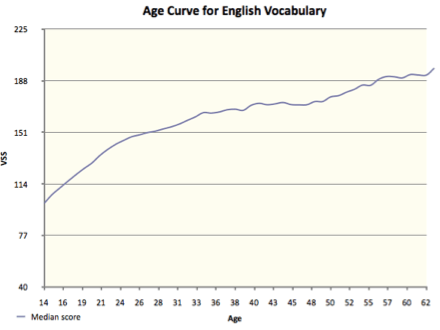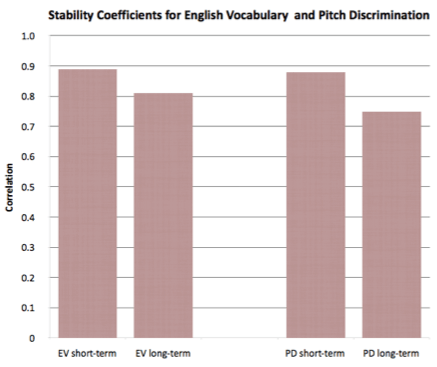
For a number of years, we have been investigating the stability of scores on our tests across time. In 2014, David Schroeder analyzed data we have collected on our English Vocabulary test. We view English Vocabulary knowledge, unlike aptitudes, as a feature that persons can improve through conscious study, and so one might expect that scores on vocabulary tests would show lower degrees of stability than would scores on aptitude tests.
To provide context for this study, the age curve for Foundation examinees on English Vocabulary is shown in the accompanying figure. As can be seen, examinees tend to gain in vocabulary across most of the lifespan, with somewhat greater gains in the teen years and more modest gains in adulthood.
Thus, one could anticipate that examinees would show gains in vocabulary as they get older, and the question for the present study was whether they would maintain their rank order relative to their age as they moved across time.
The data for this study came from the administration of English Vocabulary retests to 395 former examinees from our testing program. Of these examinees, 52 had been tested less than one year prior to taking the retest, and these were termed the “short-term sample,” while 343 were tested one year or more after their original testing,and we referred to them as the “long-term sample.” The test- retest interval for the long-term sample ranged from 1 to 21 years with a mean of 7.5 years.

For the long-term sample, examinees showed an average Vocabulary Scale Score (VSS) of 143.2 on their original testing and an average of 159.6 on their retests, and so they gained a mean of 16.4 VSS points between testings. When one adjusts for age effects, however, the examinees showed essentially the same rank order on the retest as they did on the original testing. For the long-term sample, examinees’ scores on the retest correlated .81 with their scores on their original testing, while for the short- term sample, the corresponding correlation was .89.
When one compares these values with the corresponding values for Pitch Discrimination, one can see that the correlations for Vocabulary are even a little higher than the correlations for Pitch.
Thus, it appears that in general, English Vocabulary knowledge is relatively stable over time. In other words, although people in general gain knowledge as they get older, they tend to maintain their ranking within the larger group.
Schroeder reported this study in Statistical Bulletin 2014-10, Long-Term Stability for English Vocabulary.
















